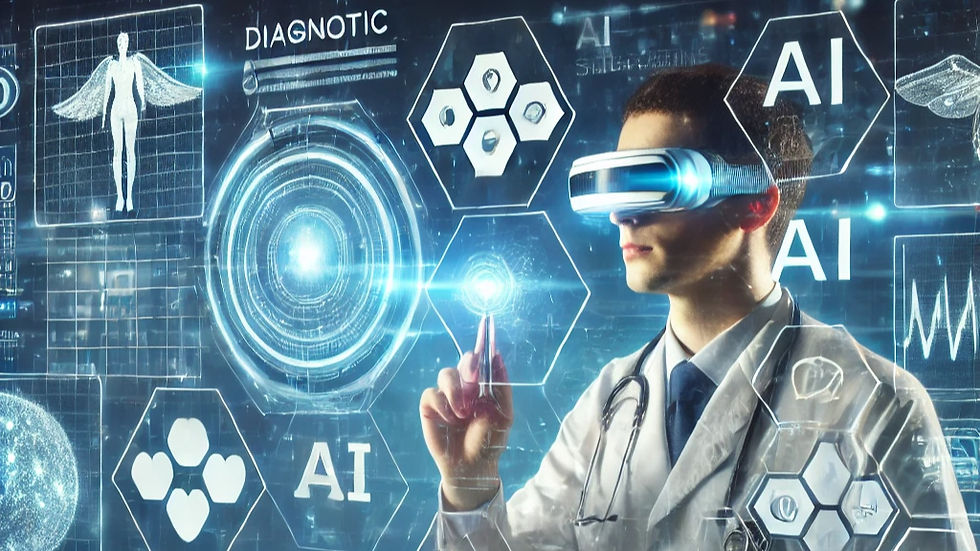Artificial Intelligence in Medicine: Replacement or Enhancement of the Doctor?
- Oct 21, 2024
- 3 min read
Updated: Sep 2, 2025
Artificial intelligence is a tireless assistant, capable of processing incredible volumes of data, making it a valuable tool for the advancement of precision medicine. AI can quickly analyze a patient's complete medical history and current health status, enabling doctors to prescribe necessary therapy in a timely manner, prevent the development of dangerous pathologies at early stages, and ultimately, save lives.

Areas of AI application in medicine
Medical diagnostics
One of the most significant achievements of artificial intelligence in healthcare is its capability to analyze medical images. An AI assistant can quickly and accurately process various image types, including MRI and CT scans, X-ray images, and cardiograms. This capability enables doctors to detect diseases rapidly, often at stages when traditional diagnostic methods may not be as effective.
Prediction
AI algorithms can model the spread of infectious diseases by considering factors like population density, geography, and the rate of virus transmission, such as predicting the dynamics of COVID-19 infections or dengue fever outbreaks. Furthermore, AI's capacity to process and analyze large volumes of data enables the creation of individual patient profiles, predicting treatment success, and minimizing potential complications.
Treatment
Thanks to AI, humanity is entering a new era of personalized treatment tailored to the unique profiles and needs of patients. By analyzing genomic data, medical history, and current health status, doctors' AI assistants can predict the progression of diseases and create individualized treatment plans. Additionally, AI has significantly reduced the cost and time needed to develop new, effective medications and has already contributed to the discovery of several drugs.
Medical data management
The implementation of AI in data management within a medical institution automates numerous processes: artificial intelligence predicts the load on medical institutions, distributes personnel and equipment, manages patient flows, assesses the quality of communication between administrators and patients, transcribes audio recordings of calls and face-to-face visits, automatically updates client cards. These capabilities help minimize the risk of errors and significantly reduce the time spent on routine tasks.
Limitations and risks of using Artificial Intelligence
While AI holds significant potential, its application in medicine should be moderate and carefully justified. It's important to consider possible risks and disadvantages, such as:
security. The priority for maintaining the confidentiality of patient data is to protect medical systems from cyberattacks;
reliability. It is important to ensure the high accuracy and reliability of AI algorithms by using a sufficient amount of high-quality data for training;
ethics. It is necessary to clearly define the division of responsibility between AI and doctors when making clinical decisions;
implementation. The use of AI in medicine should be gradual, with constant monitoring of effectiveness and safety.
AI as a reinforcement for doctors
Machine learning technologies offer new possibilities for automating complex analytical tasks that previously required substantial time and resources. Unfortunately, the healthcare system is currently facing a shortage of specialists and overload, making AI an essential assistant.
The use of artificial intelligence enables doctors to make more accurate diagnoses, develop personalized therapy programs, and predict treatment outcomes and progress. With the help of AI, medical professionals can focus more on patient care, enhance their productivity, and ensure access to quality medical services, even in challenging situations or remote areas.
The future of AI in medicine
The fast advancement of intelligent technologies shows great potential for revolutionary changes in medicine. Among the current trends:
bot-doctors. Medical AI consultants will promptly advise patients, remind them of necessary preventive measures, and provide an initial assessment of test results;
robotic surgery. Surgical interventions will increasingly become accurate and safe for patients, which will help reduce the risk of postoperative complications and expedite recovery;
regenerative medicine. Analyzing the structure of patients' tissues and creating individual organ models will significantly advance transplantation;
neural interfaces. Modern technologies utilizing neural interfaces will significantly enhance the quality of life for individuals with motor, hearing, or visual impairments.
Artificial intelligence is one of the most promising technologies in medicine, the implementation of which requires a balanced approach and consideration of potential risks. The rapid advancement of AI gives reason to hope that, in the coming years, we will see breakthroughs that can improve the lives of millions of people.



Comments